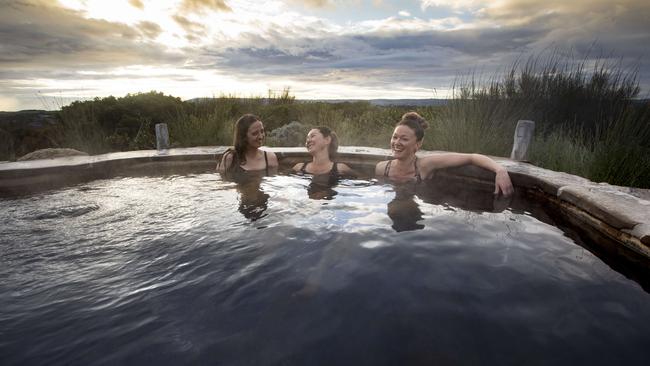Travellers seek revenge on Covid-19 with longer, more lavish trips
Tourism leaders warn staff shortages could undermine recovery of $126 billion-a-year industry.

Business
Don't miss out on the headlines from Business. Followed categories will be added to My News.
Australians’ appetite for travel over the past month is exceeding 2019 levels but tourism leaders warn ongoing staff shortages could undermine the recovery of the $126bn-a-year industry.
Google has charted the rise in travel intent, with searches for domestic trips exceeding pre-pandemic numbers by 62 per cent in April. International travel queries were also well up on the same time in 2019 as Australians looked to book longer and more lavish overseas trips, and interest in visiting down under from the UK, US and New Zealand grew.
Google Australia head of travel Michelle Allen said the data reflected the burgeoning confidence of travellers that borders would not slam shut again and disrupt their plans.
Australian Tourism Industry Council chair Evan Hall warned that the sector simply did not have enough staff to support a strong rebound in visitor numbers, after losing up to 300,000 workers in the past two years.
“Prior to the pandemic, tourism was a $126bn industry. We’re not going to get back there until the labour shortage is addressed,” Mr Hall said.
“Hotels, tour providers, restaurants, everywhere is absolutely stretched for staff and that’s putting a lot of constraints on recovery. Operators are having to reduce hours, make fewer rooms available, take less people on tours.”
The latest monthly data was cause for some optimism, however, with domestic travellers spending $5.2bn in February, up 11 per cent on the same time in 2020.
Tanya Whelan is among those facing the task of handling the uptick in tourism. She was among 14 staff who stayed on at Peninsula Hot Springs in Fingal, Victoria, during the lockdowns. She is now back on site and loving it.
“It’s such a beautiful place and not being immersed in it was difficult, but it’s wonderful to be back,” Ms Whelan said. “Like many other places it’s been difficult to rebuild the workforce, but we are well on our way.”
For Emma Henley and friends, a Sunday visit to Peninsula Hot Springs was their first significant trip since Covid restrictions eased late last year. “We thought it would be a good chance to get together and relax after a pretty full-on couple of years,” said Ms Henley, a retail worker.
Ms Allen said Google searches indicated people were looking to travel for longer and were not afraid of the cost.
“People are really prioritising travel, it’s very high up their list on what they want to spend the household budget on,” she said.
“Call it revenge travel or vacation deprivation but people feel like they need a reward after the last few years.”
The big winners from the rediscovered lust for travel were open-air attractions with a focus on health and wellbeing, all-inclusive package tours, cruising and eco-friendly resorts and hotels. Those less popular included attractions where tourists expected to find big crowds, such as India’s Taj Mahal and The Louvre Museum in Paris.
“Consumers are concerned about how busy the attractions are because they do want to have experiences that have more space, so that concern or thought about hygiene or Covid-19 is still definitely front of mind,” said Ms Allen.
At home, beaches were the top drawcard for travellers, with zoos and theme parks also popular, while day-trippers were heading to places such as the Hot Springs for a luxury “health and wellbeing” experience.
Co-founder Charles Davidson said they had just clocked their biggest April in 17 years of operation, largely as a result of undergoing expansion during the region’s extended lockdown. “We did anticipate that as soon as we were not being forced to close down that people would come back, particularly because we’re an outdoor activity, not a crowded indoor space,” Mr Davidson said.
After a difficult couple of years, Sydney’s Taronga Zoo was enjoying reintroducing its many inhabitants to a wide range of guests, including growing numbers of international visitors.
Executive director Simon Duffy said the market was rebuilding, a “really positive sign”.
“The US, UK and Singapore markets have proven particularly quick to respond, booking trips and experiences up until the end of the year,” Mr Duffy said.
“What’s really nice to see is that this increase of international visitors hasn’t meant a decrease in local visitation.”
Originally published as Travellers seek revenge on Covid-19 with longer, more lavish trips





